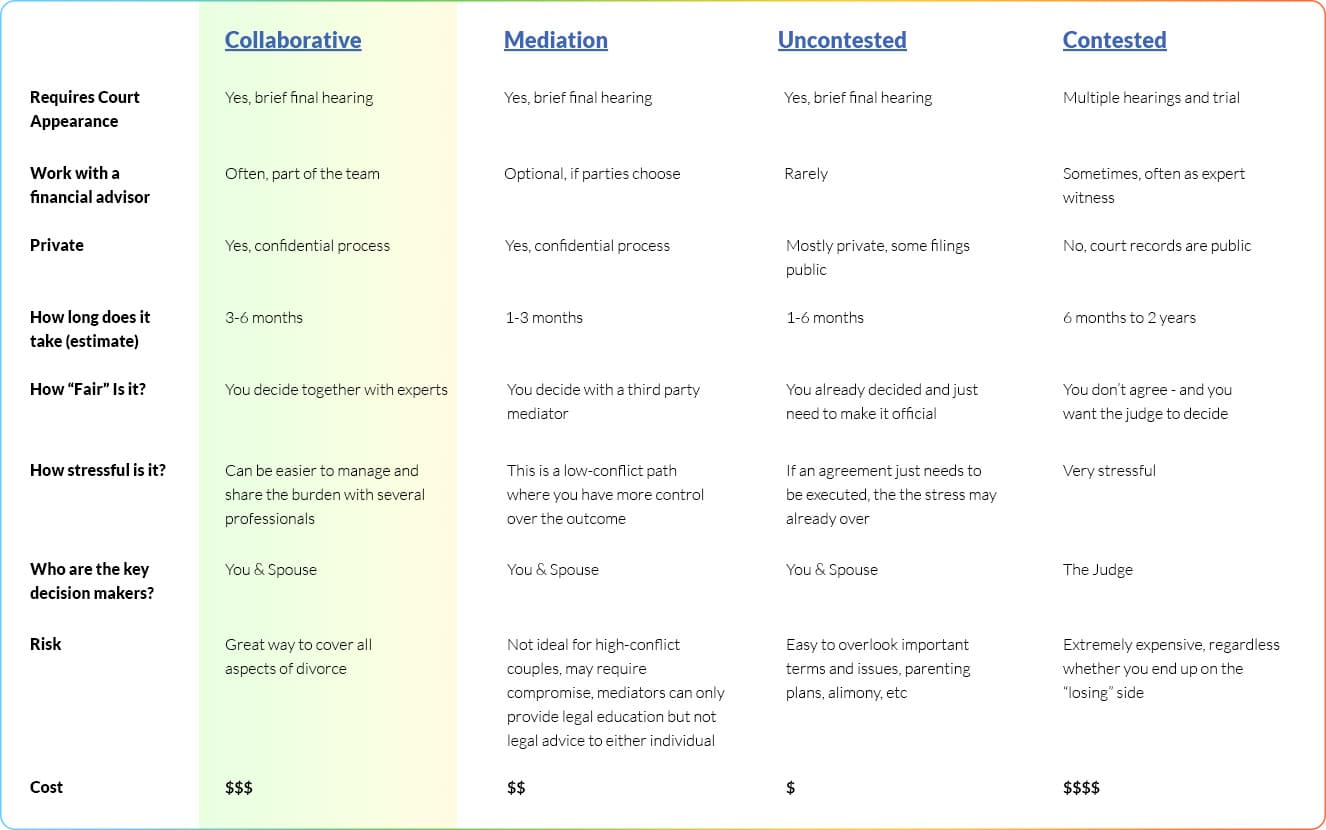Why Choose Collaborative Divorce?
Courtroom divorces often leave families feeling drained, bitter, and out of control. Collaborative Divorce takes a different approach. You stay in control, your conversations stay private, and the focus is on creating solutions that last.
Instead of fighting, you sit down with your spouse, your attorneys, and—if needed—financial or family specialists. Together, you work through the issues step by step. The goal isn’t about “winning” or “losing.” It’s to make decisions you can both live with, allowing you to move forward with your life.
Benefits of Collaborative Divorce
A Support Network. You will receive the support of the entire team, who can answer questions, address concerns, engage in option building, and find additional resources which may be helpful for your divorce (a certified divorce mortgage lender, certified divorce coach, estate planning attorney, realtor, special needs expert, etc.).
Flexible Timeline. The collaborative process can move as quickly or as slowly as you want. The team is not beholden to court deadlines and has flexibility to create the process that goes at the speed you need. Even slower collaborative matters resolve much quicker than traditional litigation divorces, which can get bogged down in the court system for years.
Privacy Protection. Collaborative divorce occurs outside of the court system, so all of the information gathering and option building occurs discreetly in a private setting. We are able to obtain your Final Judgment of Dissolution of Marriage with minimal court filings. An ordinary divorce involves all sorts of documents exposing all kinds of private details that must be filed with the court, which is open and available to the public.
Your Interests Matter. A key component of the collaborative process is learning what both spouses’ goals and interests are during and after the process. This is what makes your family unique.
Maybe financial security is of utmost concern to you. Perhaps staying in the school zone your children are currently zoned for is most important. Or it could be that you would like to be able to afford a new home after the divorce is complete.
Just as there are countless families in the world, there are countless interests and goals that make your family unique. The collaborative method integrates those goals and interests directly into the process, whereas litigation uses the same approach to every family law situation, regardless of the complexities of each family.
When Collaborative Divorce May Not Be Suitable
Collaborative divorce only works when both spouses are committed to the process. It requires honesty, transparency, and a willingness to work together. If either spouse refuses to engage openly, the process will fail.
This approach is not appropriate in certain situations:
- Lack of good faith. If one spouse is unwilling to participate sincerely, or uses the process to delay or manipulate, collaboration won’t work.
- Abuse or intimidation. If there has been domestic violence, threats, or controlling behavior, the process could be unsafe and unfair. Court protections may be necessary.
- Hidden assets. Collaborative divorce depends on full financial disclosure. If a spouse is concealing money or property, the process breaks down.
- Need for enforcement. Some cases require a judge’s involvement—particularly when one party refuses to comply.
In these situations, collaborative divorce may not be the right tool. Litigation may be necessary to ensure fairness and protection.
How Collaborative Divorce Works
Here’s what the collaborative process usually looks like:
- You each hire a collaboratively trained attorney. We’re here to guide you, not to fight battles in court.
- Everyone signs a Participation Agreement. This is the promise that you’re both committed to staying out of court and working toward a solution together.
- Your team is built. Depending on what you need, this could include a neutral financial expert to help with money matters or a neutral family specialist to support parenting decisions.
- You meet in a series of sessions. These are calm, structured, agenda-driven conversations where you and your spouse work through parenting plans, property, and finances—step by step, with your team helping along the way.
Once everything is agreed on, it’s finalized. Your attorneys prepare the settlement paperwork and submit it for court approval once everything is signed. Typically, the final judgment can be obtained without needing a court hearing.
The important thing to know is this: if the process breaks down and someone wants to go to court, both attorneys must withdraw. That keeps everyone focused on making collaboration work and reaching an agreement together.

The Artemis Family Law Approach to Collaborative Divorce
At Artemis Family Law, we understand that divorce isn’t just about ending a marriage—it’s about starting the next chapter of your life. The way you go through the process matters. You deserve a path that protects your dignity, keeps your private matters private, and helps your family move forward without unnecessary conflict.
That’s where we come in. Our attorneys, Teris Deitsch and Paul Shafranski, an accredited Collaborative Professional, are leaders in collaborative divorce here in Florida. We know how to keep the process calm, structured, and focused on solutions. Instead of wasting time and money in a courtroom fight, we help you build agreements that actually work for your family.
When you choose Artemis, you don’t have to carry the burden alone. We’ll walk you through every step, make sure your voice is heard, and give you the confidence to move forward knowing you’ve made thoughtful, lasting decisions.
Schedule Your Collaborative Divorce Consultation
If you’re considering divorce, now is the time to talk with us. A consultation is the best way to find out whether collaborative divorce is right for you—and to take the first step toward a resolution that protects what matters most.
Collaborative Divorce Frequently Asked Questions

How much does it cost?
The cost depends on how much time your collaborative matter takes to reach full resolution. While we have had collaborative matters resolved in one meeting as well as seven or more meetings, our experience is that the average matter takes around three to five meetings to reach resolution. Our office offers flexible pricing options, including flat-fee, pay-per-meeting, and lower cost hourly options, depending on your family’s financial means. We firmly believe that the collaborative process should be available to all families, regardless of income level.

Is collaborative divorce appropriate only if I get along great with my spouse?
Not at all. While it certainly helps to be on good terms with your spouse, we understand that is not always going to be the case. Collaborative is a better option than litigation for spouses who are not on good terms because the team can work to ensure that everyone is heard and that emotional conflicts are reduced. Litigation tends to inflame already tense situations and make them worse.

Do I have to share everything with the whole team?
No. Anything you share with your attorney remains confidential and private unless and until you approve sharing it with the team. There are times when it is not appropriate to share every thought with the entire team. Your attorney is there to listen to your concerns, questions, and opinions, without having to worry that these will make their way back to the whole team. That said, transparency is one of the key components of a collaborative divorce, so you are expected to share all needed financial information in order to explore options and make decisions. A breakdown in transparency will lead to a breakdown in the process.

Are the team meetings in person or virtual?
Either. Before Covid-19, the vast majority of team meetings occurred in person. Because of the adjustments that had to be made during the pandemic, the majority of meetings now occur online, to great success. We leave it up to the clients to decide their preference.

Can we proceed without the mental health neutral and/or the financial neutral?
Yes. We believe that it is best to have a full professional team, composed of two attorneys, a mental health neutral and a financial neutral. However, we understand that your situation may be relatively straightforward and one or both neutrals may not be necessary. We offer many flexible options to ensure that collaborative divorce is available to each family.

Can we use my family therapist or accountant as our neutrals?
No. It is vital that we employ neutrals who can maintain their neutrality. It is also important that we ensure that every professional team member is collaboratively trained.





